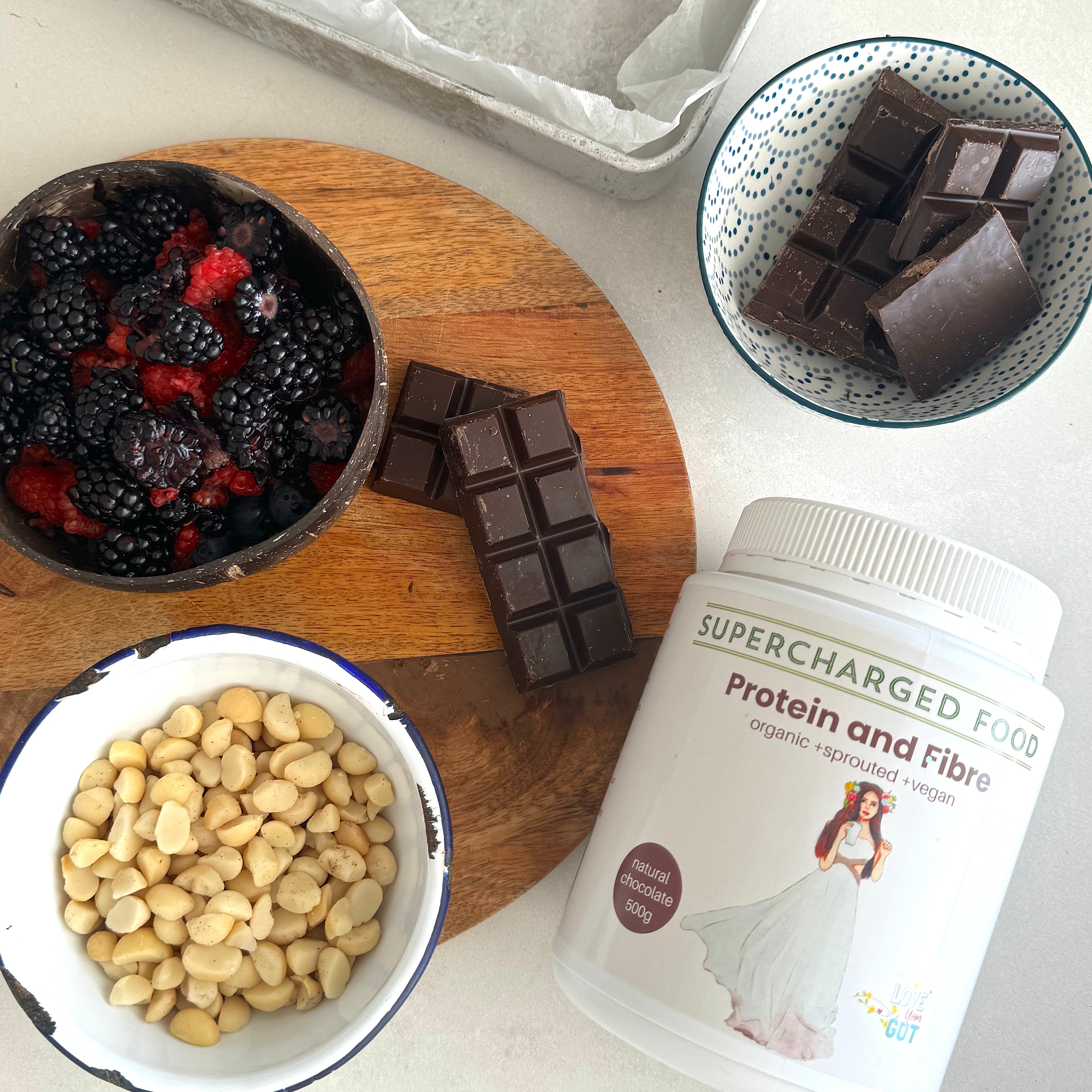If you haven’t heard by now, at Supercharge Your Gut HQ, we’re all about gut health – and with good reason. The gut is the epicentre for health, and intricately connects to every other bodily system. Not only does it dictate the way we eat, absorb and digest food, it also impacts the way we feel daily. I don’t want you to just take my word for it; I’ve done the heavy-lifting and dug for evidence-based research and clinical trials to bring you the latest on the impact of the digestive system on our overall health and wellbeing.
What is gut health?
Gut health has been a central theme in traditional Chinese medicine for centuries, as it recognises the abdomen as the location of the soul, or honoured middle.1 In the western world, beyond having ‘a gut feeling’, gut health hasn’t had much time in the limelight up until a few years ago.
If we look at the traditional Western definition of ‘health’, it is the absence of disease. So, gut health would look like ‘the absence of gastrointestinal complication or disease’; however, we now know there’s so much more to it.1 Health, and gut health, is more than not experiencing a symptom, condition or disease; it’s about being well.
In the modern world, exposure to processed foods, toxins, parasites, medications, sedentary lifestyles and stress, have left many of us feeling unwell – with the general population experiencing a list of gastrointestinal symptoms.
Gastrointestinal symptoms include:
- Abdominal cramps
- Abdominal pain
- Bloating
- Constipation
- Diarrhoea
- Flatulence
- Heartburn
- Irritable Bowel Syndrome (IBS)
- Irritable Bowel Disease (IBD)
- Loss of appetite
- Reflux
- Weight loss
- Weight gain

Components of the gut
When we talk about gut health, we’re talking about two functional entities – the gut microbiome and the gut barrier. [1-2]
The gut barrier is a semipermeable barrier that lines the gut and enables the absorption of nutrients while limiting the transportation of potentially harmful pathogens – it’s the scary bouncer outside your internal night club.3 Gastrointestinal integrity and balance are achieved by regulatory interactions between the structural and molecular components of the gut at the intestinal mucosa.3
The microbiome comprises of 1014 bacteria and prevents the colonisation of pathogenic microorganisms and infections, regulates energy and maintains an intact gut barrier.4 Impairments of the microbiome, from oral antibiotics or an unbalanced diet, can impact its functionality.1 To maintain gut health and protect the gastrointestinal wall, the microbiome must contain diverse bacteria and minimal pathogenic bacteria.
Is the gut solely for digestive purposes?
The gut doesn’t exist solely for processing foods and ensuring adequate nutrient uptake; data indicates that the function of the gut encompasses regulating the immune system, communicating with the brain and the skin.[1-5]
Research about the gut & immune system

The role of the immune system is to recognise, respond and adapt to external molecules, with the gut being the primary interface between the immune system and microorganisms.4
The microbiome exerts either anti-inflammatory or pro-inflammatory responses, depending on the state of the microbiome.4
Recent studies indicate that the composition of the microbiota, not genetics or the environment, may induce disease – maybe this is where we get the idea that an apple a day keeps the doctor away!4 When the microbiota are affected, there’s an exponential increase in inflammatory disorders, including IBD and IBS.6 While the immune system is typically regulated by the gut, in cases of IBD, there’s unrestrained immune-cell activation and inflammation, where the microbiota significantly impacts disease progression. [7-8]
Fortunately, this also means that positive gut bacteria can prevent inflammatory illnesses from colonising and therefore, prevent or limit disease.9
Research about the gut & mood
There is a bidirectional interaction between the central nervous system, the enteric nervous system and the gastrointestinal tract.10 The gut microbiota influences the development of emotional behaviour and stress, modulates pain and synthesises neurotransmitters.10
A four-week study was done on healthy women with no gastrointestinal or psychiatric symptoms to assess the impact probiotic consumption has on functional brain responses.11 After four weeks, the women who consumed the probiotic supplement had a reduced response to an emotion recognition task across a network of brain regions, including sensory and emotional areas. These changes in intrinsic activity and alterations in midbrain connectivity indicate the impact gut bacteria can have on gut-brain signalling.11
In a study done on mice, the stress-induced hormone, adrenocorticotropin, was found to be more pronounced in germ-free mice than in colonised animals.12
Research about gut & skin
The skin efficiently performs its protective functions when in a state of homeostasis; relying on a balanced gut microbiome. In cases of disturbed intestinal bacteria, metabolites can gain access to the bloodstream, accumulate in the skin and disrupt skin homeostasis, causing conditions such as acne or eczema.13
The beneficial impacts of gut bacteria on skin health have been documented in several rodent and human studies. In a placebo-controlled human study, probiotic supplementation decreased skin sensitivity and had an overall positive effect on skin barrier function and appearance.14

Supporting gut health
Current medical treatment focuses on treating disease, rather than preventing it.15 For example, some antibiotics help treat IBD, but there isn’t a strong push on prevention.15 I believe that prevention is better than cure.
Our top tips for supporting gut health and overall health:
- Chewing food properly to help smooth digestion and improve nutrient absorption.
- Stress is a lifestyle factor linked to the deterioration of the intestinal barrier via the gut-brain interactions and is a risk factor for chronic disease. Reduce stress through meditation, deep breathing and regular movement.
- Consume a predominantly plant-based diet with a wide variety of fibre-rich veggies.
- Sweep out impurities, improve absorption and heal digestion through Love Your Gut Powder, Love Your Gut Capsules And Golden Gut Blend.
- Reduce consumption of refined foods, caffeine, sugar, alcohol and medications.
- Supercharge your gut health with humic and fulvic acid to help tighten gut junctions and enhance nutrient absorption with Fulvic Humic Concentrate.

1 Bischoff, S.C. 'Gut health': a new objective in medicine?’. BMC Med 9, 24 (2011). https://doi.org/10.1186/1741-7015-9-24
2 Nieuwenhuis EE, Blumberg RS: The role of the epithelial barrier in inflammatory bowel disease. Adv Exp Med Biol. 2006, 579: 108-116.
3Vancamelbeke, M., & Vermeire, S. (2017). The intestinal barrier: a fundamental role in health and disease. Expert review of gastroenterology & hepatology, 11(9), 821–834. https://doi.org/10.1080/17474124.2017.1343143
4Round JL, Mazmanian SK: The gut microbiota shapes intestinal immune responses during health and disease. Nat Rev Immunol. 2009, 9: 313-323. 10.1038/nri2515.
5Tsurugizawa T, Uematsu A, Nakamura E, Hasumura M, Hirota M, Kondoh T, Uneyama H, Torii K: Mechanisms of neural response to gastrointestinal nutritive stimuli: the gut-brain axis. Gastroenterology. 2009, 137: 262-273. 10.1053/j.gastro.2009.02.057.
6 Belkaid, Y., & Hand, T. W. (2014). Role of the microbiota in immunity and inflammation. Cell, 157(1), 121–141. https://doi.org/10.1016/j.cell.2014.03.011
7 De Winter H, Cheroutre H, Kronenberg M. Mucosal immunity and inflammation. II. The yin and yang of T cells in intestinal inflammation: pathogenic and protective roles in a mouse colitis model. Am J Physiol. 1999;276:G1317–21
8 Sartor RB. The influence of normal microbial flora on the development of chronic mucosal inflammation. Res Immunol. 1997;148:567–76
9Macpherson, A. J., & Harris, N. L. (2004). Interactions between commensal intestinal bacteria and the immune system. Nature reviews. Immunology, 4(6), 478–485. https://doi.org/10.1038/nri1373
10 Mayer, E., Tillisch, K., & Gupta, A. (2015). Gut/brain axis and the microbiota. 125 (3): 926-938 https://doi.org/10.1172/JCI76304
11 Tillisch, K., Labus, J., Kilpatrick, L., Jiang, Z., Stains, J., Ebrat, B., Guyonnet, D., Legrain-Raspaud, S., Trotin, B., Naliboff, B., & Mayer, E. A. (2013). Consumption of fermented milk product with probiotic modulates brain activity. Gastroenterology, 144(7), 1394–1401.e14014.
12 Sudo N, Chida Y, Aiba Y, Sonoda J, Oyama N, Yu XN, Kubo C, Koga Y: Postnatal microbial colonization programs the hypothalamic-pituitary-adrenal system for stress response in mice. J Physiol. 2004, 558: 263-275. 10.1113/jphysiol.2004.063388.
13 Salem, I., Ramser, A., Isham, N., & Ghannoum, M. A. (2018). The Gut Microbiome as a Major Regulator of the Gut-Skin Axis. Frontiers in microbiology, 9, 1459. https://doi.org/10.3389/fmicb.2018.01459
14 Guéniche A., Philippe D., Bastien P., Reuteler G., Blum S., Castiel-Higounenc I., et al. (2013). Randomised double-blind placebo-controlled study of the effect of Lactobacillus paracasei NCC 2461 on skin reactivity. Benef. Microbes 5 137–145. 10.3920/BM2013.000
15 Bischoff, S.C. 'Gut health': a new objective in medicine?. BMC Med 9, 24 (2011). https://doi.org/10.1186/1741-7015-9-24







Leave a comment